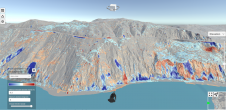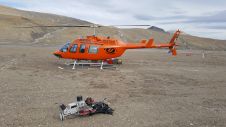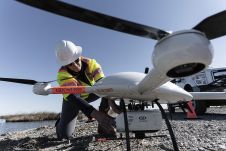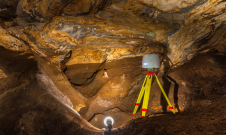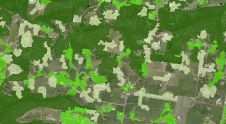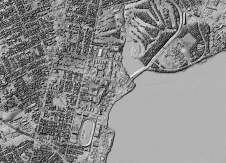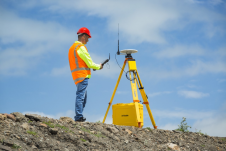Staying Debt-free Gives Us the Freedom to Do the Right Thing
GIM International Interviews Jack Dangermond
“Staying private and debt-free gives us a level of freedom to do the right thing that we would never have in a heavily-leveraged company or public company,” Jack Dangermond states in this interview. He has been exposed to entrepreneurship from a very early age. “Success requires a sustainable revenue model, that is more money coming in than going out. This sounds simple but you would be surprised how few people understand this when starting a business.” He considers himself lucky to have discovered the world of computational geography and to have developed it into a technology that helps people apply geographic services everywhere.
What motivated you and your wife Laura to start Esri in 1969?
在1960年代后期,我去了哈佛大学研究景观建筑,并接触了早期的计算机映射和空间分析。我已经手动进行地理分析,但是在哈佛,他们正在探索如何使用计算机进行操作。我对卡尔·斯坦尼茨(Carl Steinitz)和其他人在哈佛实验室(Harvard Lab)开发的新数据技术的应用很感兴趣,并开始将其用于多个学生项目,并考虑如何在环境计划和空间决策中使用它。我搬回加利福尼亚并创立了ESRI,该公司的重点是将该技术应用于现实世界环境计划项目。这导致了软件产品的开发,其余就是历史。
您的父母,来自荷兰的移民拥有家族企业。ESRI也是家族企业。那是巧合吗?
Entrepreneurship is something I was exposed to from a very early age, so it seemed very natural to start a business that would support my interests. Today that would be called a start-up! Clearly, the business skills I learned from my parents gave me a real-world ‘business school’ education that proved invaluable.
What type of company will Esri evolve into over the next ten years?
GIS continues to grow and evolve, based on advancing technology and user requests. Esri will also continue to grow and evolve in service to our users. Right now, we are adding cloud technology to our offerings of GIS technology. This, together with geoservices and device apps, is making GIS much easier and more pervasive, leveraging the connectivity of the web. It’s embedding GIS almost everywhere, in virtually everything we do. It’s our hope that this will transform how humans see the world and ultimately how they act.
技术和社会需求正在迅速变化。您对GIS工具如何适应这些更改有何看法?
ESRI仔细观察我们周围发生的事情并适应组织的历史悠久。我们从从事项目工作的咨询公司开始,随着时间的流逝,我们根据我们学到的东西创建了产品。逐渐地,我们变成了一家软件公司。随着信息技术和我们自己的产品的最新变化,我们正处于利用云计算和各种应用程序的另一个进化步骤中,这些应用程序普遍地提供了应用地理知识。我们特别关注的一件事是使我们的技术更易于使用,并向更多人使用。这确实是GIS的“应用”。GIS传统上一直是专业的技术,但是现在我们看到知识工作者在通过在移动设备或网络浏览器中运行的重点应用程序访问GIS之前从未触及过GIS的知识工作者。改变我们和客户运作方式的另一个倡议是,我们越来越关注公开共享数据。在GIS的许多应用中,数据曾经是一个严重的限制因素。现在,我们的平台带有内容。 Content is not an add-on to the platform; it is integral to the platform and makes the platform come to life. This ready-to-use content is both curated by Esri as well as authored and made available by our users.
Your big data drive may be summarised as the aim to develop computational means for unravelling hidden relationships between geo-related phenomena, not only in space but also in time. How can big data play a role in unveiling such relationships?
Many of our customers are looking at ways to implement big data technology platforms. We are supporting this in a number of ways, including development of new big data tools and partnerships with big data platform companies. What people are discovering is that GIS technology is a natural platform for integrating data from many sources and analysing patterns, trends and relationships, particularly using real-time data. Maps are a way to visualise the story behind your data: seeing spatially enabled big data on a map allows you to answer difficult questions and to ask new ones that you otherwise never would have thought to ask.
Around 50% of Esri’s revenues stem from US federal government agencies. There is a lot of geopolitical turmoil right now. How will the sliding panels affect Esri’s business activities?
The actual amount of Esri’s revenue that comes from US federal government agencies is closer to 20%. However, about 60% of our users are in the public sector, distributed at national, state and local levels and in most countries. It’s not at all surprising that governments are big users of geospatial technologies. They are the regulators of most decisions about geography, and are responsible for managing large areas. Government users are also important creators of data. In fact, the late Dr Roger Tomlinson, the ‘Father of GIS’, created the first computerised geographic information system in the 1960s while working for the Canadian government, trying to get a handle on land use and resource issues across the country. While geopolitical turmoil, along with economic uncertainty, can certainly have an impact on government activities, generally speaking this turmoil has had little effect on the GIS business. Although GIS is certainly not recession-proof, there continues to be a strong interest in applying geographic information to almost every problem. Many of these problems are exactly the kind of problems that GIS is perfectly suited to help solve.
Esri公司是一家位于加州的公司known to the general public, in contrast to Google Maps which is used by billions of people, mostly through their smartphones. Do you have any regrets that you have never evolved into a consumer-facing company?
Google has made a huge contribution by opening the world’s eyes to the power of geospatial visualisation. This has definitely helped us and our users to explain GIS and its benefit to organisations everywhere. The geospatial market is clearly distinguished between the Google-style consumer applications and the professional enterprise market which is supporting geocentric workflows, data management, analytics and decision-making. Through the rapid growth of GIS in the cloud (ArcGIS Online) together with apps on any device, GIS has become much easier and more consumer-facing. This is exposing the full power of our users’ GISs to entirely new audiences.
What is your management philosophy with respect to hiring professionals and bonus compensation?
We focus on hiring really good people who get things done. We pay them fairly, and stay focused on serving our users and developing technology that matters to them.We’ve always been opposed to sales-commission compensation, because we want our staff to genuinely focus on helping our users solve their problems rather than trying to sell something in order to get a commission.
What is your philosophy concerning taking outside investments stemming from stockholders or venture capital?
我们避免了外部投资,并认为这有助于我们的稳定和长期成功。独立使我们专注于对客户重要的事情。我们的用户很感激。今天,我们在创新上花费了约29%的年收入。这不仅仅是“普通”上市公司每年在研发上花费的。
What is your message to young entrepreneurs and start-ups?
首先,我将敦促他们去寻找他们的东西really like and something that really matters. Often those two things are connected. I was lucky to discover the world of computational geography and developed it into a technology that helps people apply geographic services everywhere. We made a choice from the beginning to not accept outside investment, to operate debt-free, and to stay private. I’m not saying this has been easy, but staying private and debt-free gives us a level of freedom to do the right thing that we would never have in a heavily leveraged company or public company. Secondly, if you wish to be successful, you need a sustainable revenue model for your product or service. Simply stated, that means more money coming in than going out. Don’t say “We’ll figure the revenue model out later,” – later might never come, or it might be too late. This sounds simple but you would be surprised how few people understand this when starting a business.
杰克·丹蒙德的传记
杰克·丹莫蒙德(Jack Dangermond)是训练的景观设计师,于1969年创立了ESRI,其愿景是,映射和分析框架可以更深入地了解我们的世界,并帮助我们设计更美好的未来。作为ESRI的创始人兼总裁,Dangermond的领导和愿景刺激了GIS技术的持续创新,使人们能够做出有见地的决定并改善各地的生活质量。Dangermond对GIS方法,GIS软件市场,GIS技术研究和相关分析方法的发展产生了强烈的影响。他获得了许多反映他作品影响的奖项,包括英国制图学会奖章,美国地质调查局的约翰·韦斯利·鲍威尔奖,卡尔·泰格尔特国际制图协会的金牌,皇家地理学会的守护神,以及国家地理学会的亚历山大·格雷厄姆·贝尔勋章。
Make your inbox more interesting.添加一些地理。
Keep abreast of news, developments and technological advancement in the geomatics industry.
Sign up for free









